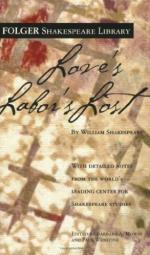|
This section contains 3,238 words (approx. 11 pages at 300 words per page) |

|
SOURCE: Kehler, Dorothea. “Jaquenetta's Baby's Father: Recovering Paternity in Love's Labor's Lost.” Renaissance Papers (1990): 45-54.
In the following essay, Kehler emphasizes the theme of deception in Love's Labour's Lost.
When Longaville first sees Maria, he asks Boyet, “Pray you, sir, whose daughter?” “Her mother's, I have heard” (II.i.201-202),1 quips Boyet, in effect withholding the information Longaville seeks—Maria's paternity. Boyet's witticism intimates that establishing paternity is chancey. Faulconbridge, the Bastard in King John, reminds John that the paternity of “all men's children” is a secret that lies in their mothers' keeping (I.i.63); and, coincidentally, Maria of Love's Labor's Lost turns out to be “an heir of Falconbridge” (II.i.205).
Variations on Boyet's jest appear in other Shakespearean comedies. In Taming of the Shrew the pedant replies to the question “Art thou his [Lucentio's] father?” with “Ay, sir, so his mother says, if I may believe...
|
This section contains 3,238 words (approx. 11 pages at 300 words per page) |

|


